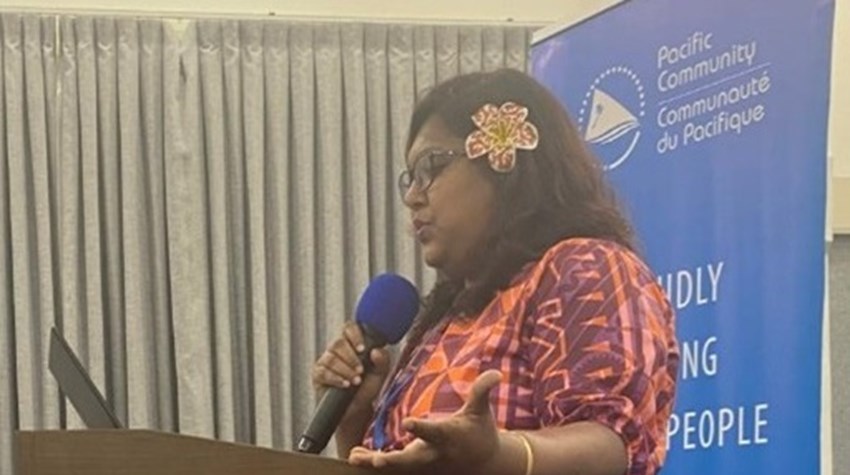In a little more than six months Rifat has managed to conduct a report reflecting an environmental scan to be used as a foundation for improved Gender representation. Rifat explains that ‘Women face barriers such as lack of technical and leadership training, gender biases, and prevalence of stereotypical social norms prohibiting them to participate and contribute[1]”.
Gender-inclusive programming, ensures that projects like those undertaken at SPC, actively consider and integrate the diverse needs and perspectives of all genders, promoting equity and inclusion. By considering ways to overcome gender blocks in planning and implementation, such programming aims to empower marginalised groups and create more effective and sustainable outcomes. That’s when the valuable work of Gender Specialist’s like Rifat toil to improve livelihoods for women, children, and ultimately whole communities.
The role has enabled Rifat to merge professional expertise with her passion for gender equity as she addresses systemic challenges, supports women’s associations, and contributes to strategies aimed at advancing gender equality in the maritime sector in the Pacific.
Rifat’s work extends to support regional and state-level Women in Maritime Associations (WIMAs) with their leadership development and policy reform efforts. She supports the "Pacific Women in Maritime Association" and state-level WIMAs by enhancing their leadership capacities, advocating for structural reforms, and changing discriminatory policies. Her contributions focus on developing gender-responsive policies, encouraging respectful workplaces, reducing the gender pay gap, and addressing Gender Based Violence (GBV) and discrimination in both workplaces and the wider community.
Rifat is dedicated to developing the Regional Strategy for Women in Maritime 2025-2030 to enhance women's skills and leadership, secure funds for women’s associations, and combat gender-based violence (GBV). Additionally, she collaborates with government and industry stakeholders to promote a gender-responsive maritime sector in the Pacific.
-----
For Rifat, the journey into gender advisory work was inspired by a deep commitment to addressing social inequalities and advocating for women's rights. In addition, her experience collaborating with UN agencies, INGOs, and NGOs, including Oxfam, Plan International, World Vision, ActionAid, and the United Nations World Food Programme (WFP) in Bangladesh, further fuelled her drive to specialise in this area.
“I have actively sought opportunities to advocate for women’s human rights and worked with gender-focused initiatives and organisations”, explains Rifat.
Gender work can be complex as it often challenges policy, and at times cultural norms however, it is so often about protection and more equal participation for women and in turn communities. Rifat’s experience in the sector spans the elimination of GBV, child marriage, workplace violence, sexual harassment, and women’s economic empowerment in both informal and formal sectors. She has also worked on advocacy for girls' rights and ensuring accountability in one of the largest refugee programs in Bangladesh. All this further informs her work at GEM division.
Rifat explains that for now, there are both long and short term goals that will be the real measure of success. They include;
“A widespread awareness among staff and the community about the importance of addressing gender barriers and needs. This involves fostering a deeper understanding of gender issues and their impact on the maritime sector among SPC and maritime stakeholders.
Effective integration of the gender advisor role into various SPC programs, including collaboration with different programs to enhance their gender sensitivity and responsiveness.
Tangible and dynamic impact through awareness initiatives, leading to meaningful changes in attitudes and practices within SPC and the maritime sector.
Recognition by senior management of the value of the Gender Advisor role, ensuring its continuity through resource allocation and support for new programs aimed at addressing gender barriers and empowering women.
Development and implementation of effective programs that address gender barriers, create opportunities for women's empowerment, and integrate these initiatives into broader GEM division projects.”
By implementing comprehensive strategies such as equal pay audits, increased awareness, effective collaboration, sustained impact, and ongoing support for gender-focused initiatives., all employees experience the benefits of an improved workplace culture and productivity.
Rifat’s role as Gender Advisor is actively fostering a culture of respect and equality, through the division’s commitment to gender equity. This is not only ethically essential but the cultural benefits promise to flow into communities for future generations.
We work where we are needed to help amplify and grow sustainable programs particularly across Asia, Pacific, Africa and the Middle East. Help us support communities in need by donating today.
[1] Safe Horizons: Women Shaping the Future in Maritime Safety- The Pacific Community, by Rifat Tanjila, August 2024.


